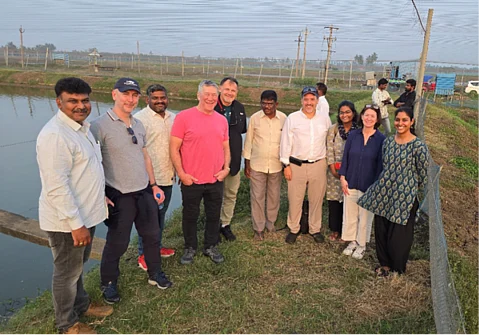

Members of the ASC and SFP teams with partners from Seafood Solutions and Dakshin Foundation visit a shrimp farm in Andhra Pradesh.
Photo: SFP / ASC.
The Aquaculture Stewardship Council (ASC) and the Sustainable Fisheries Partnership (SFP) have published a roadmap for what they call “landscape-level improvements” in aquaculture, outlining how regional collaboration can address environmental and social challenges that farm-level initiatives alone cannot.
Funded by a Walmart Foundation grant to SFP, the roadmap draws on a case study in Andhra Pradesh, India, where smallholder shrimp farming now produces close to one million metric tonnes annually. The state has set out plans to expand aquaculture from 400,000 to one million acres by 2030, a target that the organisations point out could create both growth opportunities and heightened environmental pressures.
The two organisations describe the roadmap as a practical framework for Aquaculture Improvement Projects, including step-by-step guidance, application lessons from India, and integration with existing global sustainability standards. ASC and SFP say the roadmap is intended to complement certification and other initiatives while encouraging multi-stakeholder cooperation across supply chains, government and NGOs.
Jill Swasey, ASC Director of Impacts, said taking this kind of "landscape-level" approach "elevate[s] the environmental and social performance of the region, reducing barriers and providing farmers with the opportunities to drive improvements," but she stressed "this must rely on local expertise and organizations working in the sector."
"Demonstrating these collective improvements will deliver impacts at scale," she argued.
Jim Cannon, SFP Chief Executive, emphasised the role of domestic capacity in India. “Everything we do in-country should be done by local institutions, and there is tremendous local capacity in Andhra Pradesh. Our role is just to connect the dots and work through established local players – they will be there long after you’re gone," Cannon added.
Meanwhile, Seafood Solutions’ Managing Partner, A.B.Ch. Mohan, who collaborated with ASC and SFP on the project, said the work had enabled the company "to build on our strengths and focus on the importance of effective stakeholder engagement and data synthesis for identifying actionable opportunities in shrimp aquaculture."
“Engaging with the Dakshin Foundation team also allowed us to better understand the perspectives of NGOs focused on social issues. We are eager to see this work put to use and hope it will lead to targeted recommendations and the piloting of sustainable solutions in collaboration with industry partners," he added.
The roadmap is presented as iterative, with ASC and SFP saying it will adapt to different regions and commodities. "In Andhra Pradesh, it was inspiring to see a coalition of local social, environmental, and aquaculture experts come together to lay the groundwork for holistic improvements to the farmed shrimp sector," said Paul Bulcock, SFP Aquaculture Information Manager. "I hope the insights they shared and the foundation they’ve built will be carried forward.”
